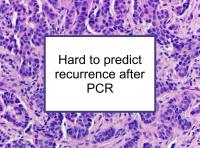Women who obtain a pathological complete response to neoadjuvant chemotherapy tend to have more favorable outcomes than those who do not. Neoadjuvant chemotherapy is chemotherapy that takes place before surgery to remove a tumor (adjuvant chemotherapy takes place after surgery).
Such chemotherapy offers the opportunity to assess the cancer's response to the treatment by examining the breast tissue that is removed during surgery. A pathological complete response means that there is no microscopic evidence of viable cancer cells in this tissue.
Despite the generally more favorable prognosis of those who achieve a pathological complete response, some such women eventually experience a breast cancer recurrence. Very little work has been done on the characteristics and treatment of such patients and whether breast cancer prognostic factors can account for these cases. Now a new study has reported that, contrary to expectations, most tumor and treatment characteristics are not linked to relapse after a pathological complete response. In fact, only African American race predicts breast cancer recurrence among such women.
Latest research finds few predictors of breast cancer relapse
The retrospective study referenced at the beginning of this news article was designed to investigate factors associated with recurrence in breast cancer patients with a pathological complete response to neoadjuvant chemotherapy. To conduct the study, the authors reviewed medical records of breast cancer patients who received neoadjuvant chemotherapy between 2000 and 2010 in St. Louis, Missouri.
Women with cancer in both breasts were excluded from the analysis. A total of 812 patients with unilateral breast cancer were followed for a median of 47.2 months. Recurrence was defined as any soft tissue or bony reappearance of cancer after completion of treatment.
A total of 138 (17%) of the participants obtained a pathological complete response. There were 14 relapses (10%) among these women during follow up. Recurrence occurred after 31.9 months, on average. The authors analyzed whether type of chemotherapy, type of surgery, type of lymph node assessment, lymph node status, race, breast cancer side, triple negative disease, and receipt (or not) of radiotherapy were associated with recurrence. Only black race was found to be associated with relapse. In fact, African American women were 5.8 times more likely to develop distant metastases than other women.
The authors conclude that race was the only independent predictor of breast cancer recurrence after achieving pathological complete response to neoadjuvant chemotherapy. They note that the reasons for this finding deserve further study.
Please see our articles on how African American breast cancer patients can improve their outcomes and prognosis of African Americans and Latinas with triple negative breast cancer for more information.
